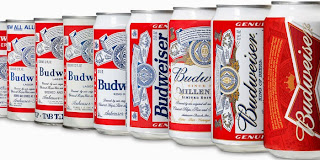They say beer will make me dumb
It are go good with pizza!
I started drinking beer in the seventies, when a handful of companies producing virtually indistinguishable lagers dominated the brewing industry.
Anheuser-Busch (which sold Budweiser, Michelob, and Busch Bavarian) was the biggest, while Schlitz was a close second. (I'm not sure what Schlitz did wrong, but its sales fell off catastrophically in the late seventies.)
Coors was a legendary brand back then in part because it wasn't available in the eastern two-thirds of the country. (Coors was brewed in a single location – Golden, Colorado – and it wasn't pasteurized, which meant it had to be refrigerated at all times. That limited its distribution to the western states.)
The also-rans included Miller (which hadn't yet invented Miller Lite), Pabst, Falstaff, Hamm's, and Stag. There were also a number of popular regional beers – like Schaefer (New York City), Schmidt's (Philadelphia), National Bohemian (Baltimore), Dixie (New Orleans), Pearl and Lone Star (Texas), and Olympia (Seattle) – but you couldn't find those beers outside of their home territories.
There were only 44 breweries in the United States in 1979. Today there are over 3400 -- 90% of which are microbreweries, defined as breweries that produce fewer than 15,000 barrels of beer annually. (A barrel is 31 gallons, or about 250 pint glasses of beer.) In 2014, there were 615 new brewery openings and only 46 closings.
15,000 barrels isn't a lot of beer. By contrast, Anheuser-Busch shipped some 37 million barrels of Bud Light last year.
But the sales of craft beers are coming on strong. In fact, the combined sales of all craft beers now exceeds the 16 million barrels of Budweiser that was sold in this country last year.
About 11% of all the beer sold in the U.S. is made by small, independent brewers, and the craft beer industry hopes to double that market share by the end of the decade.
About 11% of all the beer sold in the U.S. is made by small, independent brewers, and the craft beer industry hopes to double that market share by the end of the decade.
It sometimes seems like there's a craft brewery on every street corner. I can walk to four brewpubs from my downtown Washington, DC, office. A ride on the local subway system will transport me to almost a dozen microbreweries, and it's less than an hour's drive from the Washington Beltway to two dozen more.
You can find craft breweries anywhere you go in the United States. When I visited my parents in Joplin, Missouri, last month, I discovered a local restaurant/bar that offered 32 beers on tap. Half of the selections were from three Missouri craft breweries – Boulevard (Kansas City), Mother's (Springfield), and Piney River (Bucyrus – a tiny community about halfway between West Plains and Rolla).
Boulevard Brewing is one of the top dozen American craft breweries in terms of sales – the only Missouri brewery that produces more beer is Anheuser-Busch. Boulevard has an excellent reputation for quality, and it's "Smokestack Series" of Belgian-style beers is especially noteworthy.
Boulevard was recently acquired by Duvel, a well-known Belgian brewer for an estimated $100 million plus. That sounds like a lot, but the Belgium-based InBev paid $52 billion to acquire Anheuser-Busch in 2008.
I visited the Boulevard brewery, tasting room, and gift shop – which was chock full of Boulevard-branded T-shirts, ball caps, bike jerseys, glasses, bottle openers, keychains, and postcards – on the way to the Kansas City airport after my visit to Joplin.
Boulevard's best-selling beer is an unfiltered wheat beer, which is very refreshing. But as good as the wheat beer is, it pales in comparison to Boulevard's crazy "Tank 7" farmhouse ale (which has double the alcohol and is an infinitely more complicated brew).
 |
| Boulevard "Tank 7" bike jersey |
Boulevard produces about 180,000 barrels of beer annually, so it has outgrown "microbrewery" status. But there appear to be at least a dozen true microbreweries currently operating in the Kansas City area, with several more scheduled to open later this year. I only had time to visit one of them on the way to the airport, so I picked Cinder Block Brewery in North Kansas City.
 |
| The Cinder Block Brewery in North Kansas City |
I had a hard time choosing between two of the seasonal beers that were being served in Cinder Block's taproom -- Isle of Cinder (a Scottish-style "wee heavy" ale) and Cinder Noël (a Christmas-season winter ale). Both were not only delicious but also relatively high in alcohol – a winning combination, if you ask me.
If you're not a beer drinker, you can always visit a local winery, many of which are happy to give you a taste of their wares, or sell you a glass or a bottle to enjoy while picnicking on their grounds.
There are over 8000 wineries in the United States today. Almost two-thirds are located in California, Oregon, and Washington state, but there are quite a few in states that you might not think of as big wine producers. For example, both Virginia and Texas each can boast of over 200 wineries.
Believe it or not, there are wineries in all 50 states. (Alaska has eight, and Hawaii has four.)
 |
| Psychostick's We Couldn't Think of a Title |
Wikipedia describes Psychostick as "a comedy metal band" – which is a new genre to me. Since they got together in Phoenix in 2000, Psychostick has released four albums. "BEER!!!" is from the group's 2003 debut album, We Couldn't Think of a Title.
Here's "BEER!!!":
Click below to buy the song from Amazon. Or you can save your money and buy an IPA, a stout, or a tripel at your local microbrewery.








No comments:
Post a Comment